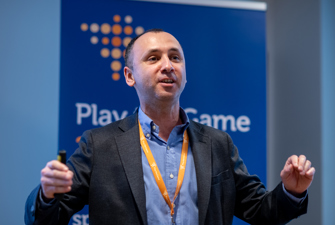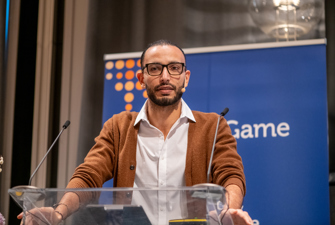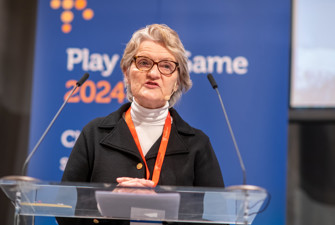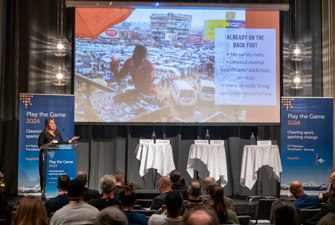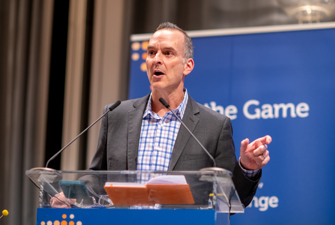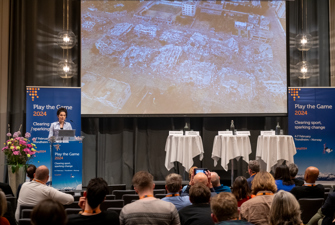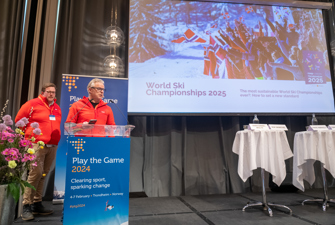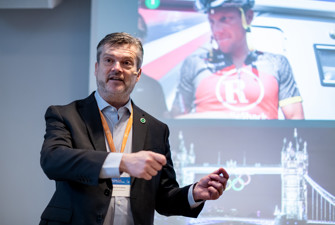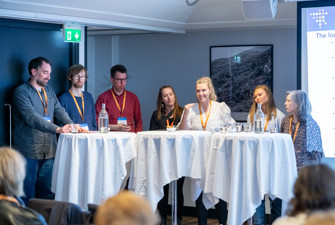Pay gaps, representation, or even being allowed to play - the struggle for women in football is far from over
Lise Klaveness from Norway and Khalida Popal from Afghanistan are two prominent women’s sport activists – one in a position of power, the other a refugee who developed an international network. At Play the Game 2024, they spoke of their ongoing struggle to support and empower women in a male-dominated world.
Lise Klaveness and Khalida Popal grew up playing football in vastly different circumstances. Klaveness fell in love with the game as a young girl in Norway, while Popal’s love affair began in her home nation of Afghanistan. As prominent advocates of women’s empowerment in sport, they shared their experiences at Play the Game’s 2024 conference in Trondheim.
Klaveness is currently the president of the Norwegian Football Association (NFF) and before that, she enjoyed a successful career as a player before retiring from the game in 2012. She then worked as a lawyer, judge and TV sports pundit before becoming NFF director of elite football. In 2022, she became the first woman to hold the rank of NFF president and also ran for a position on UEFA’s male-dominated executive committee.
Popal played a prominent role in the formation of the Afghanistan women's national football team in 2007, which she went on to captain on the field. With the women’s game increasingly seen as a focus of activism and advocacy, Popal received numerous death threats from conservative religious elements in her country.
With her safety at stake, she was forced to flee Afghanistan in 2012. Popal eventually settled in Denmark, where she founded the international NGO Girl Power.
The money gap in football is growing
Both Klaveness and Popal are now prominent advocates for women’s rights and equality in sports. Klaveness is an outspoken supporter of women’s and LGBTQ issues at high-level events attended by global football leaders, and Popal formed Girl Power in 2014 to tackle challenges faced by women, specifically refugee women, in sport.
Both are strong supporters of women in leadership roles and see the battle for gender equality as being far from over.
“It is not comfortable to compare the men’s and women’s team budgets at clubs like Barcelona and Manchester City,“ Klaveness said.
“Of course, the men’s game earns more money, but the gap is growing. The budgets for the women’s game are increasing, but they are getting weaker compared to the men’s game. It is very frustrating. The money that is invested just feeds this difference.”
The president of the Norwegian Football Association, Lise Klaveness, spoke about very different budgets for men and women's football in clubs like Manchester City. Photo: Thomas Søndergaard / Play the Game
While her bid for a seat on UEFA’s Executive Committee was ultimately unsuccessful, it placed the male domination of UEFA’s corridors of power firmly in the spotlight.
“Football is the biggest sport in the world for women, it is increasingly popular” Klaveness said. “But there is just one woman on UEFA’s executive committee. Out of twenty members, nineteen are men."
Taliban breaches FIFA’s principles on human rights and equality
When Popal arrived in Scandinavia, she experienced a clichéd view of refugees.
"They are treated as criminals, people who are here to steal jobs,” she said. “I wanted to change that narrative, that perception”.
Since its foundation, Girl Power has focused on a range of sports activities that offer support for refugees and disadvantaged women. These include the creation of support networks, leadership and knowledge exchange programs, advocacy and training and tournaments. It aims to address a lack of awareness of the importance of sports and education among refugees and ethnic minorities as well as a lack of role models.
However, Popal retains a keen interest in the plight of women in her home nation.
“Women’s football is not allowed in Afghanistan under the Taliban,” Popal said. “This clearly breaches FIFA’s principles on human rights and equality, but FIFA says that it is not their responsibility. It says that the solution is in the hands of the Afghanistan Football Association.”
With Afghanistan’s senior women’s team now exiled in Australia, Popal is at the fore of a campaign for it to be officially recognised by FIFA. Here too, she said, FIFA is passing the responsibility to the Taliban-controlled national association, stating it does not have the right to recognise teams that are not recognised by their national governing body.
“The Taliban says that women belong in the kitchen and FIFA says, okay, it is not our problem,” Popal said. “Would FIFA be as silent if a similar situation existed in a Western nation?”
Need to talk about the disruption of the European market
Klaveness is a keen observer of the new money flowing into European football and is concerned that football’s values may become lost amidst the increasing flow of riches.
“We are seeing a disruption of the European market,” she said. “Football should never be a place to hold people outside, but the investments coming in now are so big that they can affect other values. You do not meet, for example, the Saudi or Qatari FA. You meet the state, and they do not necessarily adhere to the values we do, not least freedom of speech."
"We need to be able to speak about this. All leaders have to agree on the value of being able to speak out. We will never reach solutions if we are unable to speak freely.”
She is eagerly awaiting the outcome of an independent FIFA-commissioned investigation into whether it abided by its own human rights responsibilities when the World Cup was held in Qatar, particularly the tournament's legacy for migrant workers.
“The report should give effective remedies that FIFA can implement if other countries do not,” she said. “It must assign legal responsibility.”
“It is critical to understand the goals that we set,” Klaveness said. “It is a cliché, but we must get out of our comfort zone. It is uncomfortable but necessary to lead and develop.”
When asked about the current calls for sporting boycotts of nations accused of aggression and human rights abuses, she said that they must be implemented in a nonpartisan manner.
“We should never boycott countries to plead for one side in a conflict,” Klaveness said. “We should not use sanctions to turn on aggression. It is important not to be populist. The way to spark change is not to think that people are evil.”
